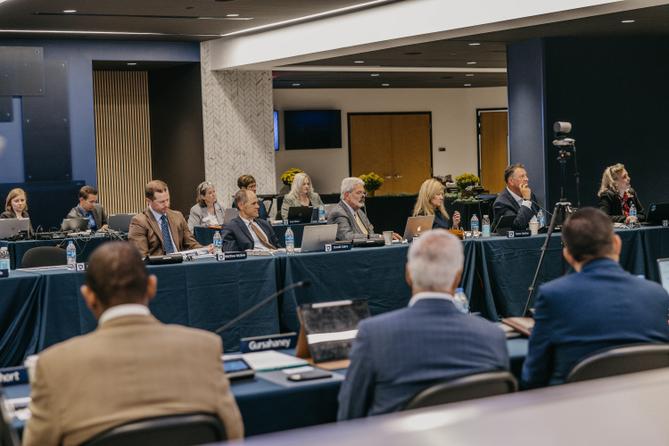STATE COLLEGE — All voting members of Penn State’s board completed training on the Sunshine Act this month as part of the governing board’s legal settlement with Spotlight PA over alleged violations of the transparency law.
The Pennsylvania Office of Open Records conducted the session during a closed-door gathering of the board last week. The training highlighted the state law’s requirements of transparency from governing bodies, the value of public access, and the legal standards Penn State’s board must follow when conducting a nonpublic meeting, according to agency materials.
As required by the settlement, Penn State released the names of trustees who participated in the live training or certified that they’d viewed a recording of the session. The participants were Robert Beard, Neeli Bendapudi, Ruby Bjalme, Randall Black, Donald Cairns, Suzan Collins, David Davis, Daniel Delligatti, Valerie Detwiler, Lynn Dietrich, Cynthia Dunn, Matthew Espenshade, Robert Fenza, Anand Ganjam, Naren Gursahaney, Chris Hoffman, Kenneth Kane, David Kleppinger, Ali Krieger, Anthony Lubrano, Kelley Lynch, Evan Myers, Matthew McGloin, Uma Moriarity, Carl Nassib, Daniel Onorato, Joseph Paterno Jr., J. Gregory Pilewicz, Julie Anna Potts, Karen Quintos, Russell Redding, Tracy Riegel, Carrie Rowe, Nicholas Rowland, Mary Lee Schneider, Matthew Schuyler, Brandon Short, and Richard Sokolov.
The list includes all voting members of Penn State’s board. Redding, Rowe, and Dunn are the state secretaries of agriculture, education, and conservation and natural resources, respectively.
Democratic Gov. Josh Shapiro, a nonvoting trustee who sits on the board because he is governor, did not complete the training. However, Shapiro’s appointed representative on the Penn State board, Myers, who attends meetings in his place, did. Myers and Bendapudi are also nonvoting members.
Starting next year, new trustees will be offered the training.
“Following the Sunshine Act is a critically important obligation for college governing boards like this one, as the decisions they make may have monumental impact on thousands of students and staff,” Liz Wagenseller, who led the session and is executive director of the OOR, wrote in a statement to Spotlight PA. “The Board of Trustees was very engaged, demonstrating a desire to follow the letter and spirit of the law.”
The settlement mandated that Penn State offer the training to trustees. Penn State also agreed that, “At the next public meeting of the Board following each in person training, the Governance Committee shall provide a report identifying all Trustees who attended or certified that they viewed the training,” according to the document.
On Sept. 12, the board’s public meeting the day after the in-person training, Penn State did not provide the report identifying the trustees. David Davis, a governor-appointed trustee and vice chair of the board’s governance committee, said the training “fulfilled the university’s settlement agreement” and thanked the OOR.
After the meeting, Spotlight PA asked Rachel Pell, vice president for strategic communications, why the trustees’ names were not provided. Pell responded that such a request would need to be submitted in writing.
Paula Knudsen Burke, the Pennsylvania attorney for the Reporters Committee for Freedom of the Press who represented Spotlight PA, emailed Pell, the university’s top lawyer Tabitha Oman, and board Chair David Kleppinger this week seeking an explanation.
In an email response to Burke that Penn State also sent to Spotlight PA, Oman said the board did not release the trustees’ names at the Sept. 12 meeting because some members had not yet reviewed a recording of the session. Penn State interpreted the settlement’s use of “next public meeting” — which was defined in the agreement — to mean “meeting cycles,” a term not used in the settlement.
“Our good faith approach to compliance with — and interpretation of — this provision stems solely from ambiguity surrounding this provision in the Agreement itself,” Oman wrote.
For years, Spotlight PA has documented how the board met privately and may have run afoul of the Sunshine Act, including trustees’ review of information about internal misconduct reports and access to the former president’s diversity initiative before it was announced. The board’s executive committee, a special group of top university and board leaders, also met privately for years to set board agendas. Following the newsroom’s reporting, statistics about the misconduct reports are available online and the executive committee meets in public.
In October 2023, Spotlight PA and the Reporters Committee for Freedom of the Press sent the board a letter requesting the trustees “immediately cease holding improper executive sessions and conferences, advertise and record meeting minutes for all public meetings, and halt the practice of deliberating in secret.” The university responded that it was following the law.
Tips
Escríbenos
During the board’s November 2023 meetings in University Park, Spotlight PA witnessed what it believed were potential violations of the open meetings law, including alleged misuses of the conference provision, and filed a lawsuit in the Centre County Court of Common Pleas. After the board’s February and May 2024 meetings, the lawsuit was amended to include additional allegations.
The case was settled in June. As part of the agreement, when the board holds a “conference” session, a type of nonpublic meeting in which trustees cannot discuss agency business, it must disclose the person leading the session and the topic. This was information that Penn State previously did not make public, and Pennsylvania law doesn’t require this disclosure.
For example, during the board’s public Friday meeting, Kleppinger said the board met privately that morning to learn about the university’s plan to close campuses and hear the president speak about international student enrollment and the “broader federal policy landscape.”
The settlement terms will last for five years. Read the full agreement here.
